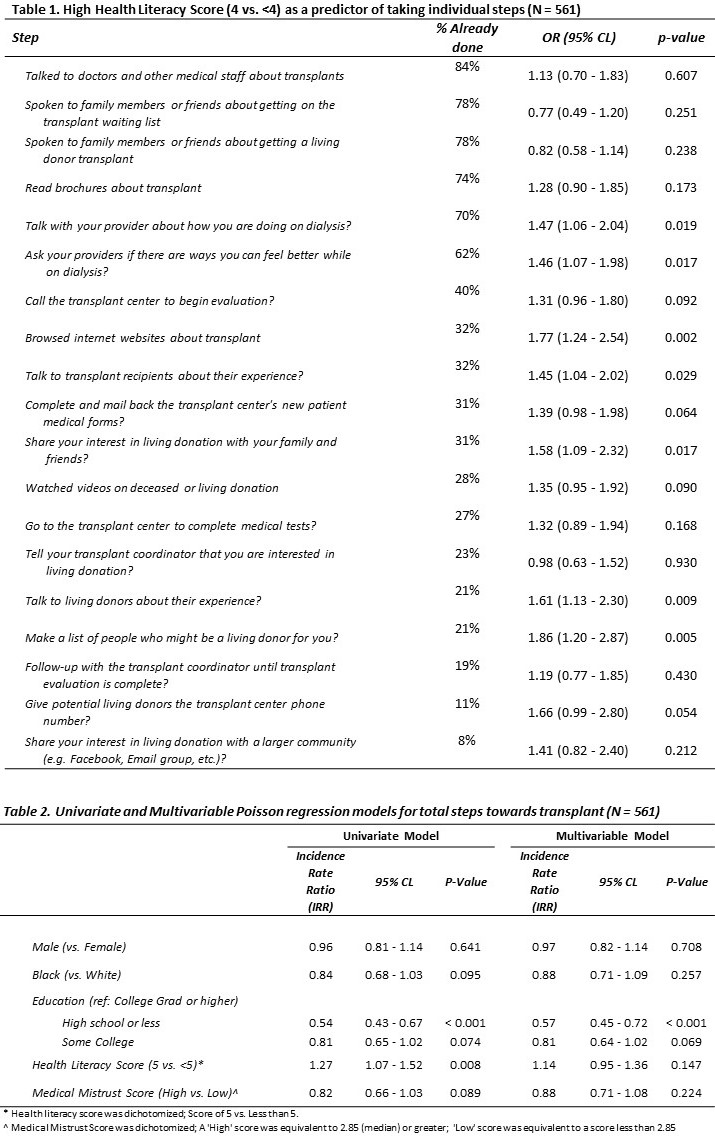Understanding the Relationship between Health Literacy, Education Level, and Transplant Actions among Low-Income and Black Patients
A. Waterman1, S. L. Skelton2, O. N. Ranasinghe1, J. L. Beaumont3, L. Alvarez3
1Transplant Research and Education Center, Los Angeles, CA, 2Southern Illinois University - Edwardsville, Edwardsville, IL, 3Terasaki Research Institute, Los Angeles, CA
Meeting: 2020 American Transplant Congress
Abstract number: D-066
Keywords: African-American, Kidney transplantation, Psychosocial, Public policy
Session Information
Session Name: Poster Session D: Kidney Psychosocial
Session Type: Poster Session
Date: Saturday, May 30, 2020
Session Time: 3:15pm-4:00pm
 Presentation Time: 3:30pm-4:00pm
Presentation Time: 3:30pm-4:00pm
Location: Virtual
*Purpose: Limited health literacy in end stage kidney disease patients is associated with low transplant referral rates. We estimated the prevalence of low health literacy among 561 low income White and Black dialysis patients; examined the association between health literacy, level of education, and steps taken in pursuit of transplant.
*Methods: Health literacy was calculated using two of the three questions of the Brief Health Literacy Screen (BHLS); assessing the amount of help needed and confidence completing hospital forms.
*Results: Over 60% of patients had a health literacy score, which indicated some deficit in health literacy. Patients with a high school education or less had the lowest health literacy scores. Patients with higher health literacy were more likely to speak with recipients about the transplant experience [OR (95% CL): 1.45 (1.04 – 2.02]), share their living donation interest with family and friends [OR (95% CL): 1.58 (1.09 – 2.32); P-value = 0.017], and make a list of potential living donors [OR (95% CL): 1.86 (1.20 – 2.87)]. Logistic regression showed that the odds of taking individual steps towards transplant were greater in patients with higher health literacy (score = 4) compared to those with lower health literacy (score < 4) (Table 1).
*Conclusions: In a univariate Poisson model, total number of steps taken towards transplant was greater in patients with higher health literacy scores [IRR (95% CL): 1.27 (1.07 – 1.52)] than those with lower scores, however in a multivariate Poisson model including gender, race, education level, medical mistrust, and health literacy, only education level predicted steps taken (Table 2). Patients’ education and health literacy levels need to be taken into consideration when designing and delivering education supporting taking actions towards transplant.
To cite this abstract in AMA style:
Waterman A, Skelton SL, Ranasinghe ON, Beaumont JL, Alvarez L. Understanding the Relationship between Health Literacy, Education Level, and Transplant Actions among Low-Income and Black Patients [abstract]. Am J Transplant. 2020; 20 (suppl 3). https://atcmeetingabstracts.com/abstract/understanding-the-relationship-between-health-literacy-education-level-and-transplant-actions-among-low-income-and-black-patients/. Accessed July 12, 2025.« Back to 2020 American Transplant Congress

